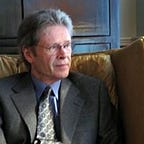Who Are These People?
”We’re still the People, but they never call us that. They taught us to call ourselves Indians. Now they’re teaching us how to call ourselves Native Americans. It’s not who we are. We’re the People.
They can’t see us as human beings. But they can’t see themselves as human beings.
The invisibility is at every level, it’s not just that we’re tucked away out of sight. We’re the evidence of the crime. They can’t deal with the reality of who we are because then they have to deal with what they have done. If they deal with the reality of who we are, they have to deal with the reality of who they aren’t. So they have to fear us, not recognize us, not like us.
The very fact of calling us ‘Indians’ creates a new identity for us, an identity that began with their arrival. Changing identity, creating a new perceptual reality, is another form of genocide. It’s like severing a spiritual umbilical cord that reaches into the ancestral past. The history of the Indians begins with the arrival of the Europeans. The history of the People begins with the beginning of the history of the People.
The history of the People is one of cooperation, collectivity, and living in balance. The history of the Indians is one of genocide, rather than a history of peace and balance. The history of the People is under attack, the Indians, in an evolutionary context is not very long; it’s only five hundred years. The objective of civilizing us is to make Indian history become our permanent reality.
The necessary objective of Native people is to outlast this attack, however long it takes, to keep our identity alive.”
— John Trudell
I belong to a people who don’t know their history. We call ourselves Americans and we think we know what that is, what it means. But if you don’t know your history, who are you? Living in a tiny village in France, I was astonished at how easy it was for French people to just go to the mayor’s office and ask for family records dating back three hundred years. My own family’s history disappears into the mists of time in two generations.
Americans are fascinated by advances in genealogy because they want to fill in the gaps that will give them some inkling of where their ancestors came from and who they might have been…
